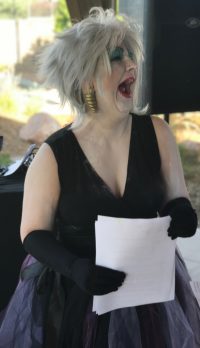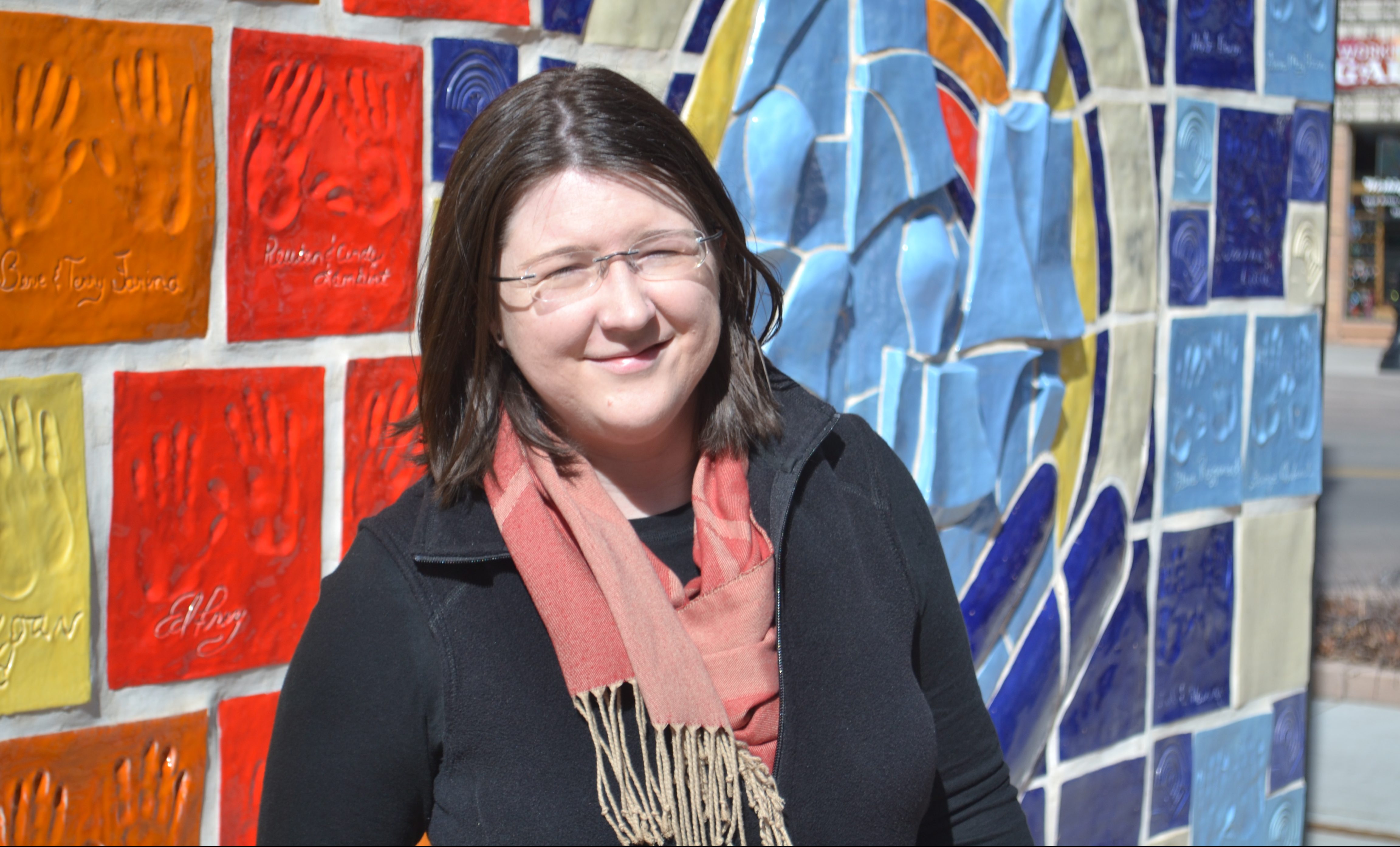Welcome to our Changemaker Profiles blog series! Each edition we profile one outstanding social changemaker from the JVA client community. By sharing the stories of some of the incredible people we get to work with every day, each accomplishing extraordinary work in nonprofits, government, social enterprise and elsewhere, we hope we will bring a little light and inspiration to your day!
For this edition, we spoke with Abby Landmeier, manager of community funding & volunteers at United Way of Mesa County and incoming chair of the Mesa County Partnership for Children and Families board of directors. United Way of Mesa County “fights for the health, education and self-reliance of children, families and individuals in our community.”
1. Tell us about your organization and the social change you are trying to achieve.
“United Way of Mesa County believes everyone should have the opportunity to achieve their full potential. We help local citizens become philanthropists, and we are the vehicle for ensuring donor dollars are being recommended by individuals in the community.
“My role is manager of community funding. This translates to being more ‘agency’ relations. Often I use the analogy of being a professor with my work—half the year I work with agencies to improve their application. When they hand in their grant, like turning in a final paper, I don’t comment until it has gone through a citizen review process.
“The largest stake in social change we have is ensuring agencies are connected. I was partially joking when I wrote my Instagram bio; however, it fits well here: ‘Community conduit fueled by coffee.’
“As far as the social change we are trying to achieve, some of what we’re trying to change is relationships. We want a strong relationship with agencies so when we ask for change, they’re a part of it, a stakeholder. And we’re really approaching everything we do with gratitude as well as curiosity. A community is a living, breathing and ever-changing landscape. We strive to be stewards and assist.”
“If we’re asking for change, we need to be mutual stakeholders. There’s a lot of vulnerability in sitting down and having coffee with agencies on the funder end. We’re not The Great and Powerful Oz with a checkbook. Agencies have started asking deeper questions, we’re fixing misconceptions, and they are challenging us in a very healthy way, asking, ‘Why are you doing what you’re doing?’
“We’re also working on collective impact, which is really exciting. It’s an opportunity to show what work we’re all contributing towards.”
2. What keeps you inspired and going when things get tough?

Abby Landmeier dressed up as Ursula from “The Little Mermaid” for the United Way of Mesa County’s annual campaign. The campaign’s theme was “Once Upon a Time.”
“I have an amazing constellation of friends and colleagues outside of my office, and some who have moved that I still keep in touch with. It’s kind of like I have a Swiss army knife, I have colleagues that have expertise in an area and can offer the different skill sets that we need.
“What keeps me at the work at United Way is that it’s never just ‘one’ thing. We have the ability to look at issues and see the interconnectedness.
“Personally, my strategy to stay in the work involves nurturing hobbies and interests. It’s taken a long time to develop some lines between work and free time. Smart phones hinder some of my ability to ‘tune out,’ and being naturally curious I always want to learn more. Music helps me shift gears, and I intentionally have built playlists to help me shift to the next meeting, or even shift my mood.”
3. What advice would you give to someone who is trying to break new ground in a traditional field?
“Nonprofit work is tough. Coming into a traditional field, it helps so much to read about the field, as well as learning about culture. Change can be slow; persistence is key. Taking time to build relationships is truly beneficial. A learning mindset, or growth mindset, aids so much in the relationship as well.
“On that note, I recommend setting boundaries and ensuring you take time for family, friends and hobbies. Innovation cannot happen if we are stressed or in a scarcity mindset. We preach self-care; it’s time to really follow through with it. Brilliant minds are entering nonprofits, and as a sector we need to retain these great minds.
“One item of extreme value is finding mentors no matter what stage you’re at in your career. I have had a mentor in a formal capacity the last two years, and it has been a big driver in my personal and professional growth.”
4. What book do you recommend to everyone you meet and why? OR What book is on your to-read list and why?
“I have two. One is ‘Being Mortal: Medicine and What Matters in the End,’ by Atul Gawande. The other is ‘Daring Greatly: How the Courage to Be Vulnerable Transforms the Way We Live, Love, Parent, and Lead,’ by Brené Brown. It’s funny, because one is definitely about life and one is definitely about death.
“I lost my grandma in 2013. I read (‘Being Mortal’) and realized it was where my family was coming from—that life should be about quality, not quantity—and the need for hospice care, that it’s better for the individual and for the family. I like that it opens up conversations. The book also left me with positive pieces to integrate into my own life. How we treat death says a lot about a community.
“With ‘Daring Greatly’ by Brené Brown, I try to live by it—knowing the power of vulnerability, the power of your own words, of showing up, being present, that conversations can be difficult but can be a wonderful thing. And I like that she’s coming from a research background.”
5. How have you worked with JVA, and how has that helped your organization?
“I have taken several classes over the years. I think it started when I was 20 and was writing grants for a child placement agency and JVA helped me. I secured the grants—I was successful the first time, and I think that’s a huge kudos to JVA. So that’s 12 years ago I was introduced.
“Since then there have been cross-overs with other groups that use JVA. Nora is working with the early childhood council, and I serve on that board. My boss serves on the Community Services Block Grant board, and Nora again helped there, so we know it’s a quality product. I have taken Write a Grant in a Day training, fundraising training and social media training with JVA over the years. There was also something when I was working on suicide prevention—JVA had a two-day training on outcome evaluation and how to work together as a group. It was tailor-made to our group needs; it was very helpful in forming a collaboration, learning what is a collaboration and what is not.
“We use JVA as a referral source if someone knows they are going to need help writing grants or with outcome evaluation. We readily recommend JVA because we have seen the quality and the service, and then seeing the quality too from the boards we sit on as an organization.”
6. What else would you want to share with us that we haven’t asked?
“Oftentimes a grant funder can be intimidating. I remember walking into rooms and hearing, ‘United Way is here,’ and watching people get nervous. This is why we are intentional on building relationships. A funding officer shouldn’t be frightening. We do want you to call when there are questions on your application, and we want to form relationships.
“Oftentimes we’re looking at the work from a different level, and it’s OK to ask how we are looking at things. Program officers exist so the organization can be stewards of the funding being delivered, and we want to aid in success. We’re human—even as a funder we’ll probably make mistakes. Keep in mind we’re part of the community as well and want success just as much as fellow citizens do.”
Keep up with the area’s most inspiring changemakers—read JVA’s Changemakers blog!







Leave A Comment